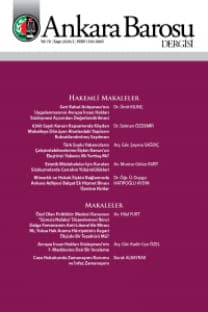Mirasın Paylaşılmasında Mirasçıların İrade Özgürlüğü ve Bu Özgürlüğün İstisnaları
Paylaşmayı isteme hakkı, Türk Medenî Kanunun 642. maddesinde düzenlenmiştir. Miras hukukunda mirasın paylaşılması açısından tanın irade özgürlüğü sayesinde mirasçılar her zaman mirasın paylaşılmasını isteyebilmektedir. Fakat mirasın paylaşılmasını isteme özgürlüğü sınırsız değildir. Makaleme irade özgürlüğünün neyi ifade ettiğini açıklamakla başladım. Genel olarak, bu özgürlüğün miras hukukundaki yerini inceledim. Mirasın paylaşılmasında irade özgürlüğünün sınırlarını; kanunun, mahkeme kararının, mirasbırakanın iradesinin ve son olarak mirasçıların anlaşmasının çizdiğini belirttim. Makalemin en önemli vurgusu ise kanunun paylaşmayı öngören hükümlerinin emredici nitelikte olmaması sebebiyle mirasbırakanın iradesinin kanundan üstün olduğu, mirasçılarının iradesinin ise her ikisinden de üstün olduğudur. Makalemde eski ve yeni kaynaklardan yararlanılmış, doktrinde egemen olan görüşler konun anlaşılması açısından çalışmama ışık tutmuştur
Anahtar Kelimeler:
Miras hukuku, Türk Medenî Kanunu, Kat Mülkiyeti Kanunu, paylaşmayı isteme hakkı, irade özgürlüğü, dürüstlük kuralı.
Free will of heirs and e xceptions of this freedom in terms of partitition of the inheritance
The right to demand partitioning has been regulated by Article 642 of the Turkish Civil Code. In accordance with the free will, recognized by the law of inheritance in terms of partitioning of the inheritance, the heirs may request partitioning of the inheritance at any time. Nevertheless, the freedom to request partitioning of the inheritance is not unlimited. I started writing this article with the definition of the term free will. In general terms, I investigated this free will within the meaning of law of inheritance. I stated that the limits of free will in terms of partitioning of the inheritance are drawn by the law, by court decision, by the will of the legator and at last by agreement of the heirs. In this article, the most important stress has been put on the fact that because the provisions of the law, envisaging the partitioning are not of a mandatory nature, the will of the legator is above the law, but the will of the heirs on the other hand is above of both of them. In this article, older and new sources have been utilized. With a view to a better comprehension of the subject, the prevailing views of the doctrine have shed light on this study
Keywords:
Law of Inheritance, Turkish Civil Code, Property Law, right of requesting partitioning, free will, rule of honesty,
- ISSN: 1300-9885
- Yayın Aralığı: Yılda 4 Sayı
- Başlangıç: 1942
- Yayıncı: Ankara Barosu Başkanlığı
Sayıdaki Diğer Makaleler
Hukukun ve Ahlakın Sınırlarında: Yapışık İkizler
Bir Koruma Tedbiri Olarak Koruyucu Aile Kurumu ve Koruyucu Aile Yönetmeliği
İdarenin Denetim Yetkisinin Özel Kişilere Devrine Anayasa Mahkemesi'nin Yaklaşımı
Yrd. Doç. Dr. Elvin Evrim DALKILIÇ
Mirasın Paylaşılmasında Mirasçıların İrade Özgürlüğü ve Bu Özgürlüğün İstisnaları
Nükleer Korku Gölgesinde Uluslararası Barış ve Güvenlik
Elektronik İzleme ile Hapis Cezasının Konutta Çektirilmesi
